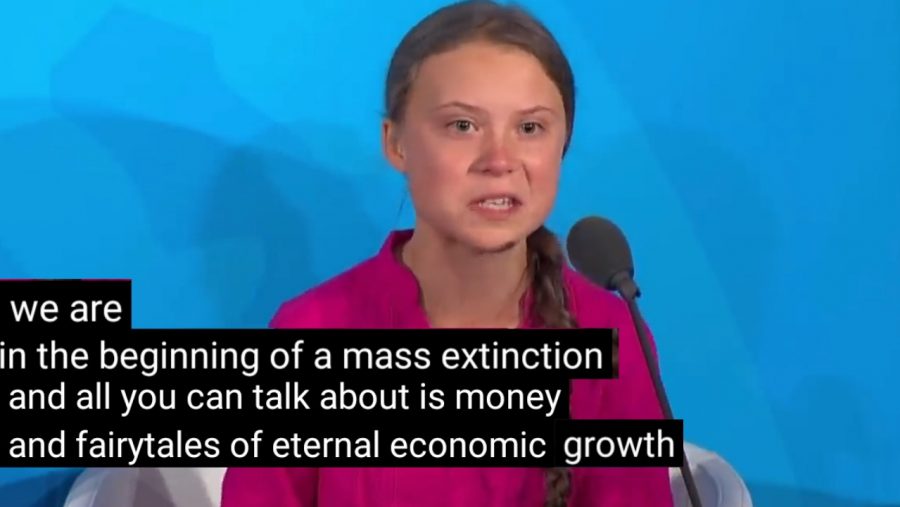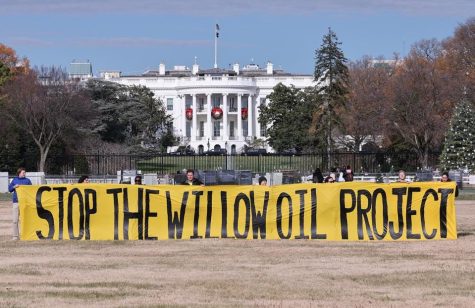“There Is No Planet B” The Political Side of Climate Change
“I remember thinking that it was very strange that humans, who are an animal species among others, could be capable of changing the Earth’s climate. Because if we were, and if it was really happening, we wouldn’t be talking about anything else. As soon as you’d turn on the TV, everything would be about that. Headlines, radio, newspapers, you would never read or hear about anything else, as if there was a world war going on. But no one ever talked about it.” (Greta Thunberg)
I imagine many people have the same experience of growing up alongside climate change. It marched behind us constantly, at times giving us threatening looks and maybe throwing a brick every once in a while. As we have gotten older, the bricks have turned to hurricanes, and now, according to a report released by the Melbourne Center for Climate Restoration, human society “will collapse by 2050 if we fail to act on the climate crisis.” By some reports, the estimate is sooner. Reports like these are reasonably horrifying but to the youth, they are also incredibly disillusioning. As children, we expected the adults to take care of problems as they arose in our society. It is the essential responsibility of the aging generations to pass down an improved world.
Instead, we inherited a dying planet, and “no one ever talked about it.” The presumption that the older generations would be motivated to fix everything (or as much as they could) in time has only faded further as we watch the effects of climate change grow, and our responses stagnate. Initiatives to tackle carbon emissions are in place through progressive legislation like The Green New Deal, however the legislation remains a somewhat fringe topic for a congress unreceptive to contemporary progressivism, and therefore is unlikely to manifest into substantial, material change. Economist Robert Pollin argues however, that even if the Green New Deal were passed into law exactly as it stands today, as a piece of national legislation it would not seriously challenge the international threat of climate change.
Pollin discusses in length the economic implications of all responses to climate change in his report, “DE-GROWTH VS A GREEN NEW DEAL.” Pollin weighs the different economic results according to different plans of action, namely: degrowth, (regression to less industrialized form of society) a Green New Deal, and nothing. He ultimately determines that any socioeconomic movement besides an immediate global initiative to rapidly decrease carbon emissions would be cataclysmal for the future of human existence, and more importantly, not economically viable. Additionally, Pollin provides insight on what a global green-energy transition would look like, and the effect it would have on the global economy.
“It is true that absolute decoupling on a global scale is a highly challenging project. But we can be fairly precise in measuring the magnitude of the challenge. As discussed above, it will require an investment level in clean renewables and energy efficiency at about 1.5–2 percent of global GDP annually. This amounts to about $1 trillion at today’s global economy level and $1.5 trillion average over the next twenty years. These are large but realistic investment goals which could be embraced by economies at all levels of development, in every region of the globe.”(Pollin)
We debate with powdered faces on national television to discuss if the cost of avoiding extinction is too high. Political pundits across the political spectrum offer alternative responses to extensive plans like The Green New Deal. This economic discourse is important to spark discussion about climate action, yet the validation of such dissent begs the question: What use is the promotion of a compromising response to an existential threat? This topic is discussed at length by “Existential climate-related security risk: A scenario approach,” a climate change report written by David Spratt and Ian Dunlop for The Melbourne National Centre for Climate Restoration.
“Analysis of climate-related security threats in an
era of existential risk must have a clear focus on the
extremely serious outcomes that fall outside the
human experience of the last thousand years.
Traditionally, risk is assessed as the product of
probability and damage. But when the damage is
beyond quantification, this process breaks down. With
existential risks, learning from mistakes is not an
option, and we cannot necessarily rely on the
institutions, moral norms, or social attitudes developed
from our experience with managing other types of risk.
What is needed now is an approach to risk
management which is fundamentally different from
conventional practice. It would focus on the high-end,
unprecedented possibilities, instead of assessing
middle-of-the-road probabilities on the basis of
historic experience” (Spratt, Ian 7)
It is imperative to understand how to think about climate change, before we take massive global steps to address it. The issue of climate change doesn’t exist within the bounds of normal political discourse where we ask, “What is the political side of X?”, like ISIS, or Rascal Flatts. It should be seen as a completely unprecedented type of crisis within human history, and our response to it must be unprecedented: international and absolute. In addition, we must understand that its existence is rooted in the ways we power transportation, heat and cool our homes, and fuel our industry. It is a direct result of the actions in our society, and will continue to be until we drastically change the means through which we power our societies; We are climate change.
Global, societal restructuring of our energy systems is necessary to sustain a future for the human race. There is valid criticism of the current actions being taken against climate change like the Green New Deal or other progressive legislation. What is vital to understand, however, is that the alternative to an aggressive Green New Deal-type program is not a more conservative-cost saving approach. The alternative is death.











